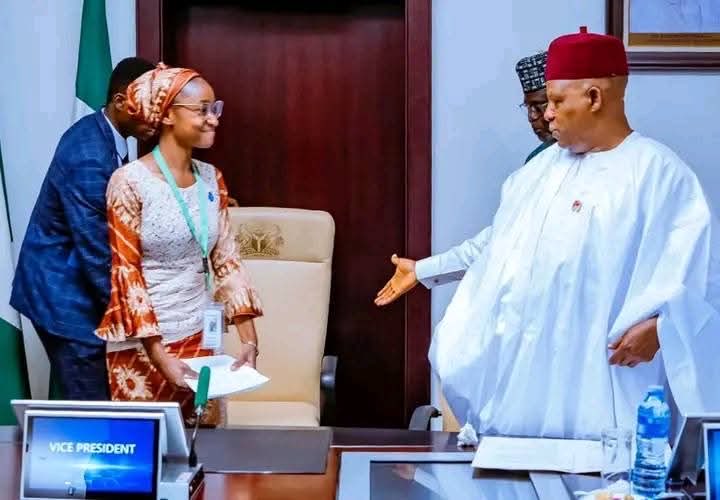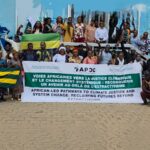In a powerful demonstration of the government’s commitment to empowering young women, teenager Joy Ogah was symbolically installed as Nigeria’s ‘Vice President for a Day’ on Monday.
The event, which took place at the Presidential Villa in Abuja, saw Vice President Kashim Shettima temporarily yield his seat to the young advocate to mark the International Day of the Girl-Child.
Pan-Atlantic Kompass reports that the gesture, facilitated by the global non-profit organisation PLAN International, is said to be aimed at inspiring Nigerian girls and underscoring the importance of gender inclusivity in leadership.
It was also gathered that the handover took place during a meeting on Monday between Vice President Shettima and a delegation from PLAN International, led by Helen Mfonobong Idiong, Director of Programme, Quality, and Innovation.
Ogah used the unprecedented platform to deliver a passionate address, focusing on the critical need for advancing girl-child education in Nigeria.
Speaking from the Vice President’s chair, the newly appointed ‘Vice President for a Day’ did not mince words about the challenges facing her peers.
Ogah highlighted what she described as a troubling statistic that 10.5 million children are currently out of school across the country, with over 60 percent of them being girls.
She called on policymakers, citizens, and development partners to take “deliberate actions” to protect girls’ rights and strategically advance girl-child education in Nigeria.
Crucially, she called for the provision of free sanitary products in schools and improved access to water, sanitation, and nutrition for Nigerian children.
This was contained in a press statement issued by the Office of the Vice President on Tuesday.
“We must invest in education that is safe and inclusive for every child in Nigeria,” she said, urging policymakers and stakeholders.
Ogah also urged the government to provide free sanitary products in schools and ensure access to clean water, sanitation, and proper nutrition for all children. She stressed that every girl deserves a classroom, a choice, dignity, and not silence.
“When girls are protected, peace becomes possible. I may be the ‘Vice President for a day’, but the struggles I represent cannot end in a day. They must continue in our policies, our classrooms, our conversations, and our budgets,” she said.
Addressing a delegation, Vice President Shettima reaffirmed the administration’s dedication, stating, “We cannot disenfranchise half of our population and expect to grow as a nation.”
He highlighted that the school feeding programme remains a key intervention to keep children, especially girls, in school and ensure they are well-nourished.
Shettima also used the occasion to reaffirm President Bola Tinubu’s commitment to advancing girl-child education and inclusive learning nationwide.
“We will continue the engagement with PLAN International and see where the force and strength of government can be brought to bear on your solid advice on girl-child education.
“In President Bola Tinubu, you have an ally you can believe in and invest your trust in,” Shettima said.
Pan-Atlantic Kompass reports that the development comes amid a growing demand for gender inclusivity in education, politics, and nation-building.
On October 20, 2025, advocacy groups urged all tiers of government to invest more in girl-child education, mentorship, and sensitisation programmes, calling for stronger efforts to eliminate gender bias in schools.
In September, the Federal Government launched the Renewed Hope Social Impact Interventions (RH-SII774) targeting over 10 million women across all 774 local government areas through livelihood grants, digital inclusion, and clean energy initiatives.
Similarly, the Ministry of Education and the National Assembly have reinforced support for gender parity and access to learning.
The government’s recent workshop on inclusive education, coupled with the Student Loans Act and increased education funding, reflects ongoing institutional commitment to equity.





